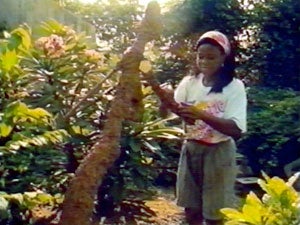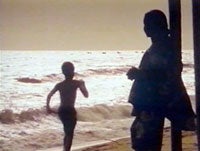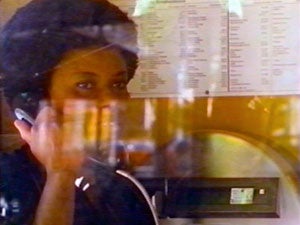After almost three years of intense preparation, our film exhibition program “L.A. Rebellion: Creating a New Black Cinema” is nearing completion. The program is printed, our catalog at the printers. We are showing no less than 57 films by more than 20 African and African American filmmakers who attended UCLA between 1970 and 1985, who we believe constitute a movement of great important to the history of African American cinema. As noted in a previous blog, this project has been particularly challenging because we had to not only identify, find and engage the filmmakers, but also in most cases preserve their work and make new projectable copies. That work continues, and in fact we have just discovered another major work, which regrettably will not be in our initial program.

Ijeoma Iloputaife, who uses the nom de plume Omah Diegu, was a film student from Nigeria at UCLA in the late 1970s and early 1980s. She produced several films while in school, including African Woman U.S.A. (1983), but her magnum opus is a personal documentary feature, The Snake in My Bed (1995), a Nigerian-German co-production. Ironically, I knew about this film, because in 1995 as Director of the Munich Filmmuseum, I was a member of the Kuratorium Junger Deutscher Film, a German government commission that funded first features of young filmmakkers, which provided support for Die Schlange in meinem Bett. However, until we recently contacted Ijeoma Iloputaife, who is today again living in Los Angeles, I had no idea she was a member of the Rebellion. In common with many L.A. Rebellion films, Snake touches on such themes as institutionalized racism, colonialism and the plight of women of color.

Narrated in the first person by the filmmaker as an epistle to her son, The Snake in My Bed tells Diegu's story as a Nigerian woman in Lagos who is romantically pursed by a German national who has “gone native.” Despite his secretive and duplicitous actions, she eventually agrees to marry him and has his child, only to learn that he is a bigamist with a German wife and child. She travels to Germany to give birth to her son and have him officially recognized as a German citizen from Neustadt am Main, since, according to Nigerian (i.e. Ibo) custom, a person’s identity can only be defined by the home village of the father. Without paternal acknowledgement, a Nigerian child remains a non-person, an outcast without a home. Despite the German government’s legal recognition of Nigerian marriages to German nationals, the German authorities not only fail to prosecute the “husband” for bigamy, but also actively protect him from any paternity responsibilities. However, they underestimate a mother’s tenacity in protecting her child’s interests.

The first half of the film takes place in Lagos and environs, as Omah Diegu retraces her steps, visiting family and friends, attending a Nigerian wedding and church services, getting her hair braided, attempting to register her son in a German school. Employing, long, lyrical takes, the director’s camera emphasizes her people’s unity with, and integration into, the natural environment. Once in Germany, she narrates her exhausting battles with an intransient and overtly racist Jugendamt (child welfare office), Ausländermeldeamt (registry office for foreigners), and Standesamt (Justice of the Peace), while her images depict a friendly and benign German urban landscape, as well as her visits with German friends who had supported her battles.

Personally, I could identify. Not only had I witnessed the way German bureaucrats treated people of color during my own annual trips to the Registry office when I was studying in Germany, but my wife and I also adopted a Chinese child while living in Munich. For three months, despite my daily trips to the Munich authorities, they were determined to deny a residency permit to my child; I was specifically told a Caucasian child would not have been a problem.
In any case, The Snake in My Bed is one more indication of the important contributions made by African student filmmakers to the L.A. Rebellion, including Ruby Bell-Gam, Shirikiana Aina, Teshome Gabriel, Haile Gerima and Akintunde Oguleye. The film’s negative is still in Germany, but hopefully we will be able to repatriate the film.






 Mobile Navigation
Mobile Navigation


Comments